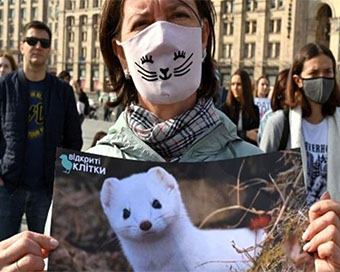Gallery
 PM Modi visit USA
PM Modi visit USA Only the mirror in my washroom and phone gallery see the crazy me : Sara Khan
Only the mirror in my washroom and phone gallery see the crazy me : Sara Khan Karnataka rain fury: Photos of flooded streets, uprooted trees
Karnataka rain fury: Photos of flooded streets, uprooted trees Cannes 2022: Deepika Padukone stuns at the French Riviera in Sabyasachi outfit
Cannes 2022: Deepika Padukone stuns at the French Riviera in Sabyasachi outfit Ranbir Kapoor And Alia Bhatt's Wedding Pics - Sealed With A Kiss
Ranbir Kapoor And Alia Bhatt's Wedding Pics - Sealed With A Kiss Oscars 2022: Every Academy Award Winner
Oscars 2022: Every Academy Award Winner Shane Warne (1969-2022): Australian cricket legend's life in pictures
Shane Warne (1969-2022): Australian cricket legend's life in pictures Photos: What Russia's invasion of Ukraine looks like on the ground
Photos: What Russia's invasion of Ukraine looks like on the ground Lata Mangeshkar (1929-2022): A pictorial tribute to the 'Nightingale of India'
Lata Mangeshkar (1929-2022): A pictorial tribute to the 'Nightingale of India' PM Modi unveils 216-feet tall Statue of Equality in Hyderabad (PHOTOS)
PM Modi unveils 216-feet tall Statue of Equality in Hyderabad (PHOTOS)The Badminton Association of India (BAI) has announced a 14-member-strong India squad for
- Men’s Sr Hockey Nationals to be played in division-based format from April 4
- Mensik denies Djokovic 100th title in Miami final
- KIPG: Son of a vegetable vendor, Bihar’s Jhandu Kumar eyes Worlds, 2028 Paralympics
- Hardik Singh credits hard work and team unity for receiving HI Midfielder of the Year award
- Djokovic, Alcaraz land in same half of Miami draw
International Animal Rights Day: Laws against animal cruelty need to be stricter Last Updated : 10 Dec 2020 12:19:03 PM IST 
File Photo international Animal Rights Day is celebrated annually on December 10, which coincides with the anniversary of the Universal Declaration of Human Rights in 1948.
All animals have the right to live just like us. In many countries, including India, there are strict laws against animal cruelty. However, they are often restricted only to dogs, cats and wild animals. The law permits the use, exploitation and slaughter of some animals that are mainly farmed animals.Amjor Chandran, animal rights activist, points out: "The livestock population in India has increased by 4.6 percent, from 512 million in 2012 to nearly 536 million in 2019. They are breed into existence to meet the demand of animal products. Hence, more than 90 percent of animals are farm animals but they are not recognised as individuals like other animals."Even with those animals whose rights are recognised, laws need to be stricter. In many cases a paltry penalty of just Rs 100 enables animal abusers to get away quickly, he adds.The kind of animals whose right to live is acknowledged varies in different cultures. In Hindu culture, cow is considered holy. It is the reason why in some parts of our country cow slaughter is banned. In the Western countries, they have strict animal right laws, but there is no restriction in slaughtering and eating of cows there.In China people are free to eat dogs, even bats and other animals, but capital punishment is given to those who kill panda. So depending on the culture and tradition we grow up in, the way we look at certain animals changes, says Chandran, co-organiser of Vegan India Movement."This form of discrimination is called speciesism," he says. "Speciesism' is the idea that being human is a good enough reason for human animals to have greater moral rights than non-human animals. A prejudice or bias in favour of the interests of members of one's own species and against those of members of other species."Veganism is an ethical stance against this form of discrimination which rejects the commodity status of animals. A vegan seeks to exclude as far as practically possible all sorts of exploitation of animals. Hence, it doesn't support zoos, circuses and wouldn't buy animal products or products tested on animals. In dietary terms, it means absolute abstain from food products derived from animals like dairy, meat, honey, cheese and eggs. In every industry where animals are used they are exploited and abused."We all are born in a world that conditions the mind to believe that animals are ours to be used and exploited. Once you realise it is done for all the wrong reasons that's when a person decides to go vegan," Chandran concludes.
IANS New Delhi For Latest Updates Please-
Join us on
Follow us on








172.31.16.186







